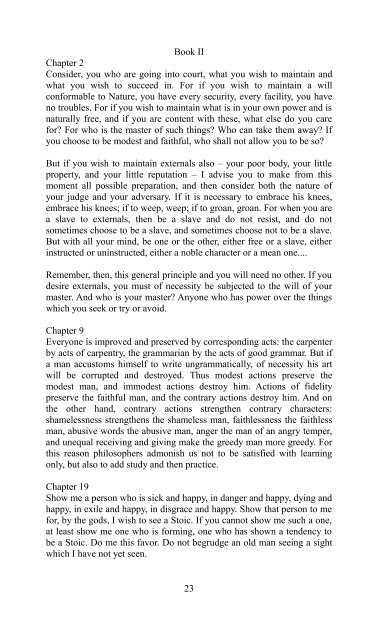The Stoic HANDBOOK - College of Stoic Philosophers
The Stoic HANDBOOK - College of Stoic Philosophers
The Stoic HANDBOOK - College of Stoic Philosophers
Create successful ePaper yourself
Turn your PDF publications into a flip-book with our unique Google optimized e-Paper software.
Book II<br />
Chapter 2<br />
Consider, you who are going into court, what you wish to maintain and<br />
what you wish to succeed in. For if you wish to maintain a will<br />
conformable to Nature, you have every security, every facility, you have<br />
no troubles. For if you wish to maintain what is in your own power and is<br />
naturally free, and if you are content with these, what else do you care<br />
for? For who is the master <strong>of</strong> such things? Who can take them away? If<br />
you choose to be modest and faithful, who shall not allow you to be so?<br />
But if you wish to maintain externals also – your poor body, your little<br />
property, and your little reputation – I advise you to make from this<br />
moment all possible preparation, and then consider both the nature <strong>of</strong><br />
your judge and your adversary. If it is necessary to embrace his knees,<br />
embrace his knees; if to weep, weep; if to groan, groan. For when you are<br />
a slave to externals, then be a slave and do not resist, and do not<br />
sometimes choose to be a slave, and sometimes choose not to be a slave.<br />
But with all your mind, be one or the other, either free or a slave, either<br />
instructed or uninstructed, either a noble character or a mean one....<br />
Remember, then, this general principle and you will need no other. If you<br />
desire externals, you must <strong>of</strong> necessity be subjected to the will <strong>of</strong> your<br />
master. And who is your master? Anyone who has power over the things<br />
which you seek or try or avoid.<br />
Chapter 9<br />
Everyone is improved and preserved by corresponding acts: the carpenter<br />
by acts <strong>of</strong> carpentry, the grammarian by the acts <strong>of</strong> good grammar. But if<br />
a man accustoms himself to write ungrammatically, <strong>of</strong> necessity his art<br />
will be corrupted and destroyed. Thus modest actions preserve the<br />
modest man, and immodest actions destroy him. Actions <strong>of</strong> fidelity<br />
preserve the faithful man, and the contrary actions destroy him. And on<br />
the other hand, contrary actions strengthen contrary characters:<br />
shamelessness strengthens the shameless man, faithlessness the faithless<br />
man, abusive words the abusive man, anger the man <strong>of</strong> an angry temper,<br />
and unequal receiving and giving make the greedy man more greedy. For<br />
this reason philosophers admonish us not to be satisfied with learning<br />
only, but also to add study and then practice.<br />
Chapter 19<br />
Show me a person who is sick and happy, in danger and happy, dying and<br />
happy, in exile and happy, in disgrace and happy. Show that person to me<br />
for, by the gods, I wish to see a <strong>Stoic</strong>. If you cannot show me such a one,<br />
at least show me one who is forming, one who has shown a tendency to<br />
be a <strong>Stoic</strong>. Do me this favor. Do not begrudge an old man seeing a sight<br />
which I have not yet seen.<br />
23

















